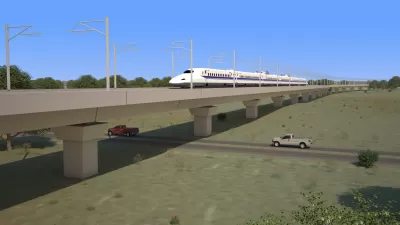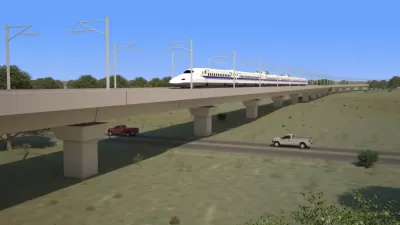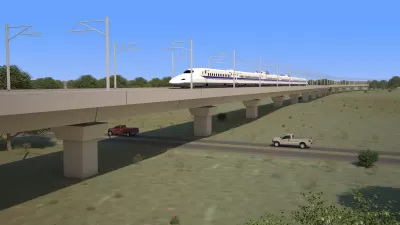Texas Central has its construction contracts and a court decision in its favor, but significant obstacles remain for the high-speed rail project connecting Houston and Dallas to get underway.

"Privately funded high-speed rail developer Texas Central has signed a $16 billion 'final agreement' with Italian firm Webuild Group and its U.S. subsidiary Lane Construction Corp. to build its 236-mile line connecting Dallas and Houston," reports Marybeth Luczak. The announcement comes with a large caveat, however: the project has yet to secure funding to pay the new contractors.
Luczak details some of the difficulties in reporting on the project, saying Texas Central and its media relations contractors have not been willing to provide much specific detail on proect financing. Available information about project financing has not been updated since fall of 2020, according to Luczak, despite recent inquiries.
Texas Central media representatives were willing to estimate the launch of construction in late 2021 or late 2022.
According to the article, Webuild is planning to replicate performance metric established by the Japanese Tokaido Shinkansen system, operated by Central Japan Railway Co., with train speeds of up to 200 mph.
"The system is planned to link Dallas and Houston, with an intermediate station west of Roans Prairie in Grimes County and near Texas A&M University, on a dedicated right-of-way. Travel time is being advertised at less than 90 minutes. Webuild estimates that approximately 6 million riders will use the train by 2029 and 13 million by 2050," according to Luczak.
In other news related to the project, the Texas Supreme Court declined a case that attempted to block Texas central from using eminent domain to acquire right of way for the project. Kim Roberts reports on the demise of the case made by homeowners against the project in an article for The Texan.
FULL STORY: Texas Central: Contractor Secured. Funding?

Alabama: Trump Terminates Settlements for Black Communities Harmed By Raw Sewage
Trump deemed the landmark civil rights agreement “illegal DEI and environmental justice policy.”

Planetizen Federal Action Tracker
A weekly monitor of how Trump’s orders and actions are impacting planners and planning in America.

The 120 Year Old Tiny Home Villages That Sheltered San Francisco’s Earthquake Refugees
More than a century ago, San Francisco mobilized to house thousands of residents displaced by the 1906 earthquake. Could their strategy offer a model for the present?

In Both Crashes and Crime, Public Transportation is Far Safer than Driving
Contrary to popular assumptions, public transportation has far lower crash and crime rates than automobile travel. For safer communities, improve and encourage transit travel.

Report: Zoning Reforms Should Complement Nashville’s Ambitious Transit Plan
Without reform, restrictive zoning codes will limit the impact of the city’s planned transit expansion and could exclude some of the residents who depend on transit the most.

Judge Orders Release of Frozen IRA, IIJA Funding
The decision is a victory for environmental groups who charged that freezing funds for critical infrastructure and disaster response programs caused “real and irreparable harm” to communities.
Urban Design for Planners 1: Software Tools
This six-course series explores essential urban design concepts using open source software and equips planners with the tools they need to participate fully in the urban design process.
Planning for Universal Design
Learn the tools for implementing Universal Design in planning regulations.
Jessamine County Fiscal Court
Caltrans
Institute for Housing and Urban Development Studies (IHS)
City of Grandview
Harvard GSD Executive Education
Toledo-Lucas County Plan Commissions
Salt Lake City
NYU Wagner Graduate School of Public Service





























